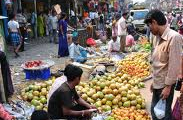 New Delhi, Dec 1: Rising retail inflation has pushed homemakers to cut down their kitchen budgets and reduce consumption of essential commodities, including vegetables, fruits and pulses, by almost 40 per cent in the last three years, says an Assocham study.
New Delhi, Dec 1: Rising retail inflation has pushed homemakers to cut down their kitchen budgets and reduce consumption of essential commodities, including vegetables, fruits and pulses, by almost 40 per cent in the last three years, says an Assocham study.
High prices have forced households to compromise on nutrient-rich food, it said.
"Nearly 72 per cent of lower-middle class families, covered in the survey, said they have been forced to squeeze their budgets for fruits, vegetables and milk by about 40 per cent because of consistent high retail prices," it said.
The chamber claimed that it has surveyed over 3,000 people, in a period of two months beginning October to November 2013, in National Capital Region, Mumbai, Kolkata, Chennai and Pune.
"The price rise of essential commodities and expenses on other necessities like education, transport and health has stayed higher than the pace at which earnings have increased, thus making life difficult for the poor, lower income and even middle-class families," Assocham Secretary General D S Rawat said.
The survey said that even the good old affordable tomatoes, onion, lady finger and potatoes are becoming unaffordable even for the middle-class families.
Prices of potato, onion and tomatoes are the three most common vegetables used in every household. Prices have shot up because supplies have slowed down due to unseasonal rains at the time of harvesting in key growing states.
The costlier vegetables such as onions had drove retail inflation to 10.09 per cent in October, entering double digits after seven months.
The survey said food price spiral has pinched all the lower and middle-class families across the board.
"More than 62 per cent of salaried families said that they shell out between Rs 4,000 to 6,000 on vegetables and fruits now, while this expenditure was one-fourth of it about three years ago. So, they are now forced to rethink their daily menus," it said.
The chamber asked the government to take immediate steps to control the situation.





Comments
Add new comment